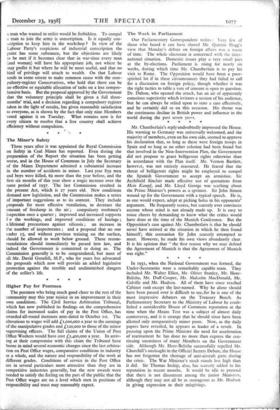In 1931, when the National Government was formed, the Under-Secretaries
were a remarkably capable team. They included Mr. Walter Elliot, Mr. Oliver Stanley, Mr. Hore- Belisha, Mr. Duff-Cooper, Mr. Malcolm MacDonald, Mr. Colville and Mr. Hudson. All of them have since reached Cabinet rank except the last-named. Why he alone should have been passed over is difficult to see, for he is one of the most impressive debaters on the Treasury Bench. As Parliamentary Secretary to the Ministry of Labour he estab- lished a considerable House of Commons reputation at the time when the Means Test was a subject of almost daily controversy, and it is strange that he should since have been allotted only comparatively minor posts. Now, as the daily papers have revealed, he appears as leader of a revolt. In pressing upon the Prime Minister the need for acceleration of rearmament he has done no more than express the con- tinuing uneasiness of many Members on the Government side. Although Mr. Hore-Belisha successfully repelled Mr. Churchill's onslaught in the Official Secrets Debate, the House has not forgotten the shortage of anti-aircraft guns during the crisis. The War Minister's stock stands less high than it did. Sir Thomas Inskip, also, has scarcely added to his reputation in recent months. It would be idle to pretend that there is not discontent among the junior Ministers, although they may not all be as courageous as Mr. Hudson in giving expression to their misgivings.


































 Previous page
Previous page